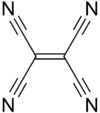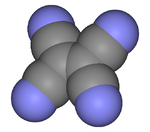Tétracyanoéthylène
- Tétracyanoéthylène
-
| Tétracyanoéthylène |
|
 
Structure du TCNE |
| Général |
| Nom IUPAC |
éthène-1,1,2,2-tétracarbonitrile |
| Synonymes |
éthylène tétracarbonitrile |
| No CAS |
670-54-2 |
| No EINECS |
211-578-0 |
| PubChem |
12635 |
| SMILES |
|
| InChI |
InChI : Vue 3D
InChI= 1S/ C6N4/ c7- 1- 5( 2- 8) 6( 3- 9) 4- 10
|
| Apparence |
solide jaune |
| Propriétés chimiques |
| Formule brute |
C6N4C6N4 |
| Masse molaire[1] |
128,091 ± 0,0056 g·mol-1
C 56,26 %, N 43,74 %,
|
| Propriétés physiques |
| T° fusion |
198,85 °C [2] |
| T° ébullition |
223,05 °C [2] |
| Thermochimie |
| ΔfH0gaz |
688,1 kJ·mol-1 [2] |
| ΔfH0solide |
607,1 kJ·mol-1 [2] |
|
Unités du SI & CNTP, sauf indication contraire.
|
Le tétracyanoéthylène, généralement abrégé en TCNE, également appelé éthylène tétracarbonitrile, est un composé chimique de formule (N≡C)2C=C(C≡N)2. Il se présente sous forme d'un solide jaune semiconducteur de type n (accepteur d'électrons) qui peut donner des sels de Bechgaard. Il s'hydrolyse en libérant du cyanure d'hydrogène HCN en présence d'humidité et doit donc être manipulé avec les précautions qui s'imposent.
Les groupes –C≡N ont des orbitales π* de basse énergie, de sorte que quatre groupes cyano conjugués avec la double liaison centrale constituent un système accepteur d'électrons. Le traitement du TCNE avec des iodures donne ainsi l'anion correspondant :
- C2(CN)4 + I – → [C2(CN)4] – + ½ I2
Compte tenu de son caractère d'accepteur d'électrons et de sa configuration plane, le TCNE a été utilisé pour préparer de nombreuses structures supraconductrices organiques en formant des complexes à transfert de charge.
Articles liés
Notes et références
Wikimedia Foundation.
2010.
Contenu soumis à la licence CC-BY-SA. Source : Article Tétracyanoéthylène de Wikipédia en français (auteurs)
Regardez d'autres dictionnaires:
Tetracyanoethylene — Chembox new Name = Tetracyanoethylene ImageFileL1 = TCNE.png ImageSizeL1 = 100px ImageName = ImageFileR1 = TCNE3D.png ImageSizeR1 = 150px ImageNameR1 = tetracyanoethylene IUPACName = tetracyanoethene OtherNames = TCNE Section1 = Chembox… … Wikipedia
tetracyanoethylene — noun The unsaturated nitrile (N≡C)C=C(C≡N) used in the manufacture of dyes … Wiktionary
670-54-2 — Tétracyanoéthylène Tétracyanoéthylène Structure du TCNE Général … Wikipédia en Français
TCNE — Tétracyanoéthylène Tétracyanoéthylène Structure du TCNE Général … Wikipédia en Français
Киселев, Владимир Дмитриевич — В Википедии есть статьи о других людях с такой фамилией, см. Киселёв. Владимир Кисилёв Дата рождения: 23 ноября 1942(1942 11 23) (70 лет) Место рождения: Кубань Страна … Википедия
Tetracyanoethylen — Strukturformel Allgemeines Name Tetracyanoethylen Andere Namen … Deutsch Wikipedia
Cyanocarbon — Cyanocarbons are a chemical compounds that contain several cyanide groups. Such substances generally are classified as organic compounds, since they are formally derived from hydrocarbons by replacing one or more hydrogen atoms with a cyanide.… … Wikipedia
Bond length — In molecular geometry, bond length or bond distance is the average distance between nuclei of two bonded atoms in a molecule. Explanation Bond length is inversely related to bond order, when more electrons participate in bond formation the bond… … Wikipedia
Bechgaard salt — A Bechgaard Salt is any one of a number of organic charge transfer complexes that exhibit superconductivity at low temperatures [The Physics of Organic Superconductors and Conductors, A.G. Lebed (Ed.), (Springer Series in Materials Science , Vol … Wikipedia
Owen Webster — Owen W. Webster (born March 25, 1929) is a distinguished member of the organic and polymer chemistry communities. His polymerization technique for making block copolymer dispersing agents is used by DuPont to make ink jet printer inks. Born in… … Wikipedia


